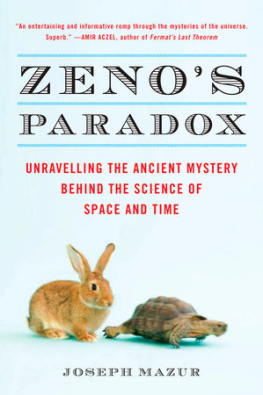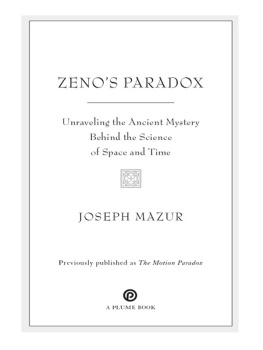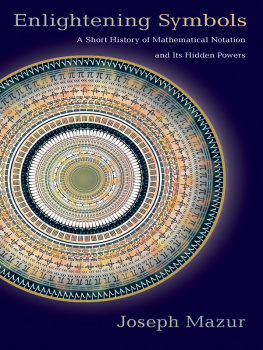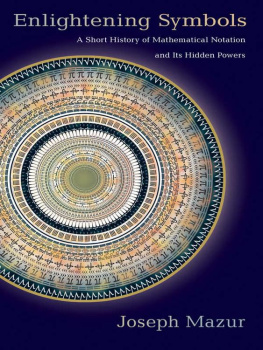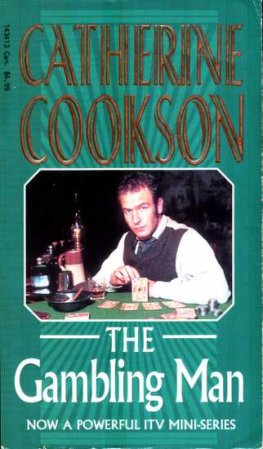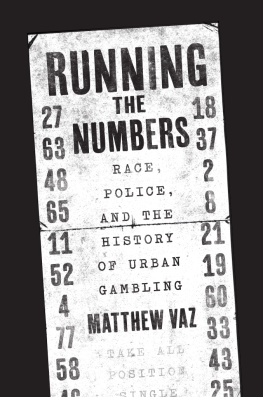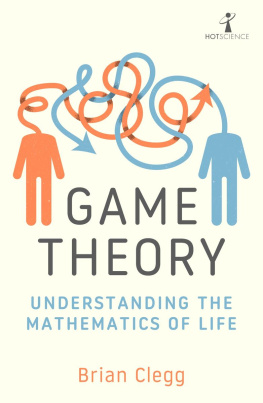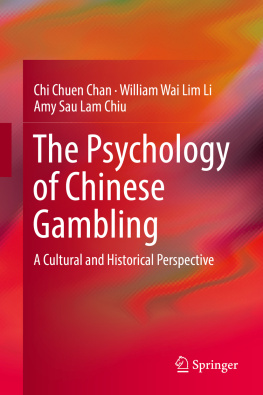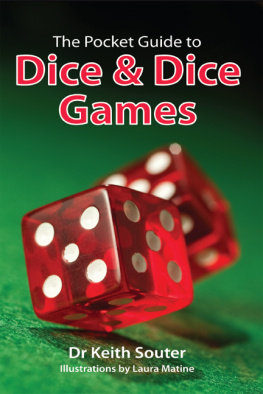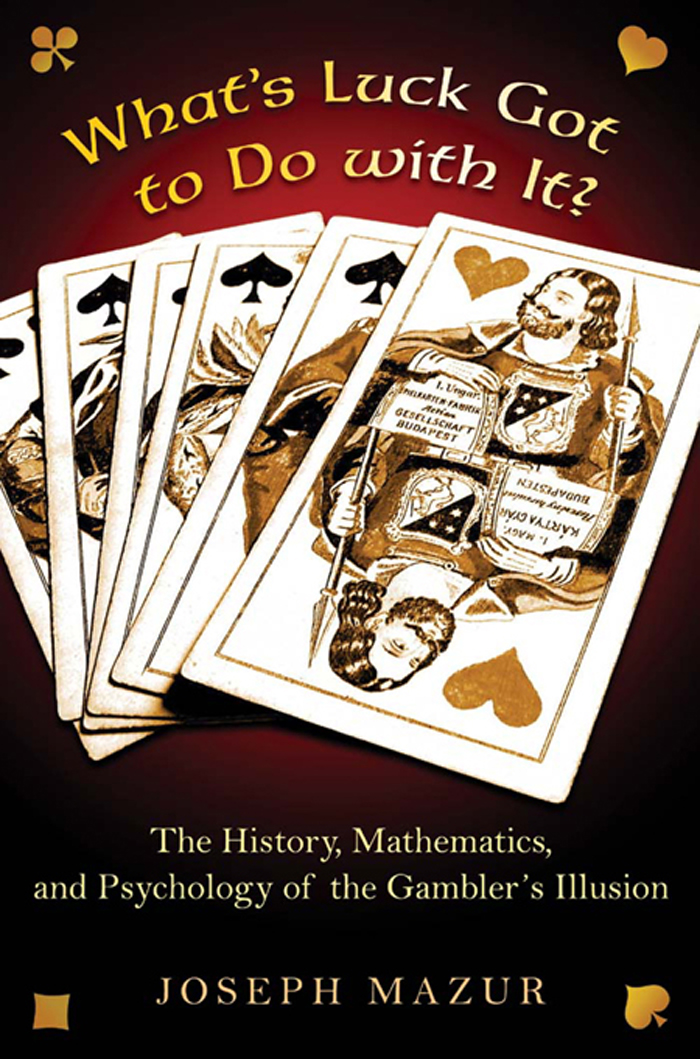Whats Luck Got
to Do with It?
JOSEPH MAZUR
Whats Luck Got
to Do with It?
The History, Mathematics, and
Psychology behind the Gamblers Illusion
PRINCETON UNIVERSITY PRESS
PRINCETON AND OXFORD
Copyright 2010 by Joseph Mazur
Requests for permission to reproduce material from this
work should be sent to Permissions, Princeton
University Press
Published by Princeton University Press, 41 William Street,
Princeton, New Jersey 08540
In the United Kingdom: Princeton University Press,
6 Oxford Street, Woodstock, Oxfordshire OX20 1TW
All Rights Reserved
Library of Congress Cataloging-in-Publication Data
Mazur, Joseph.
Whats luck got to do with it? : the history, mathematics, and
psychology behind the gamblers illusion / Joseph Mazur.
p. cm.
Includes bibliographical references and index.
ISBN 978-0-691-13890-9 (hardcover : alk. paper)
1. Games of chance (Mathematics) 2. Chance
Psychological aspects. 3. GamblingSocial aspects.
I. Title.
QA271.M39 2010
519.27dc22
2009045799
British Library Cataloging-in-Publication Data is available
This book has been composed in ITC New Baskerville
Printed on acid-free paper.
press.princeton.edu
Printed in the United States of America
1 3 5 7 9 10 8 6 4 2
To Jennifer
the Jackpot 
If by saying that a Man has had good Luck, nothing more was meant than that he has been generally a Gainer at play, the expression might be allowed as very proper in a short way of speaking: But if the Word Good Luck be understood to signify a certain predominant quality, so inherent in a Man, that he must win whenever he Plays, or at least win oftener than lose, it may be denied that there is any such thing in nature.
Abraham De Moivre,
The Doctrine of Chances (1716)
You cannot win
if you do not play.
Proberb | You cannot lose
if you do not play.
The Wire
(Marla Daniels) |
Contents
Rolling to Discover Fate
Luck Becomes Measurable
Gaming Becomes Big Business
From Bans to Bookies
The 2008 World Economic Calamity
One Deal as Likely as Another
Making Predictions with Probability
Betting against Expectation
The Weak Law of Large Numbers
Even Great Talent Needs Some Good Fortune
The House Money Effect
Psychomanaging Risk
What Makes a Gambler?
Expecting Long Runs of the Same Outcome
The Dicey Illusion
Introduction
Everything that happens just happens because
everything in the world just happened.
Uncle Herman
When I was a child, my uncles would gather every Saturday at my grandparents house to sit at a long dining room table telling jokes while accounting their weeks gambling wins and losses. My grandfather Morris would retire to a musty back room, crank up his red-brown mahogany Victrola, lie diagonally across a double bed with his eyes closed and his feet off to one side, and listen to the distant voice of the velvety soprano Amelita Galli-Curci sing Gildas arias from Rigoletto.
Gambling was the family pastime. During those moments when my grandfather was half asleep on the bed next door, my uncles were eager to hook me onto horse racing. My uncle Sam would give me a quarter and betting instructions.
You gotta analyze, he said one day. You gotta know the value of the odds. But the first and most important thing is to be sure that your horse has a good chance of coming in on your bet. If you dont like a horse cause of its name or cause you dont feel lucky that day, dont bet on it. And dont bet on a horse thats overly backed. Here, look at Victory Dancer, shes a three-to-one favorite, whaddaya think?
I dont like the name, I said.
Good! Then it doesnt give you good luck. How about
I was a very impressionable young boy and took good luck to be some invisible thing enigmatically passed from one person to another. There were times when I had it, days when Id wake with it, moments when I could feel it; and then there were times when I sensed it disappointingly gone like the fudge at the bottom of a sundae. One day I won a minor door prize at Radio City Music Hall. What luck! I won a tub of Topps bubblegum and was called to the stage to pick it upvery exciting. That day I had it and felt it with an empowering energy that could have propelled me to the stars. But the next day my bicycle was stolen from a rack of twenty others and I spent the day whining, Why me? to myself.
Had it not been for my uncle Herman, I would have believed that the Roman goddess Fortuna turning her wheel impelled the rise and fall of my own luck. On days when I knew my number was on top, I would risk tossing my glass aggie shooter in a game of marbles or buy a few packs of bubblegum baseball cards and feverishly unwrap them, hoping to find a Phil Rizzuto or Mickey Mantle.
Herman walked into the room at the moment Sam was giving me gambling instructions. Somehow my uncle Herman escaped the gambling gene. He was monumentally built, tall, sturdy, and solid with an imposing power of speech and a voice that was both mellow and thunderous, like the roar of a lion that had swallowed a gallon of honey. Herman warned me of the family gambling addiction.
Watch out for your uncles Sam and Al, Herman said. Theyll give you fifty cents and youre hooked forever. Theyll give you advice on a horse that will win and from then on its in your blood.
What will be in my blood? I asked, thinking he meant contamination leading to some foul disease.
The nasty Hialeah delusion, he said.
Whats that?
Its the message whispered in a gamblers ear whenever he comes close to a racetrack.
What does it whisper?
Youve got luck on your side, he whispered as if it were some secret meant only for my ears. Belief that you have luck on your side confuses you to think you have supernatural personal control of what happens to you. But you know there really isnt any such thing as luck to have or not have. Everything that happens just happens because everything in the world just happened.
They only gave me a quarter, I said, just to set the record straight.
Not completely understanding his little secret, I continued to believe that my own luck gave me absolute control, at least for those days when I had luck, and placed my quarter with Sam to bet on some horse called Brightstar to show. It showed all right. I had no reason for picking one thoroughbred from the next, but there was something in that name Brightstar and something in that day at the races that passed the torch of luck to me. Collecting fifty cents, I felt the heat of the torch and was hooked.
Herman was angry, because he knew that the thrill of that first win was the hook. Now Herman had a funny laugh that seemed to come from his nosenot a snort, but rather a nice laugh that was honest and charming. But when he was angry, his powerful voice would rise in volume and deepen in pitch to assure you that he was irked and that youd better attempt to change his displeasure.
Okay, okay, said Sam after Herman boomed out his censure. Your uncle is right. You were lucky this time. But you should remember that in the end the track wins.
You should remember more than that, Herman thundered. Look at your uncles who sit around this radio every Saturday afternoon after theyve called their bookies. Do they look rich to you? If they know so much about horses and gambling, why arent they rich? Dont gamble on a horse that you know nothing about. Even the best horse can slip in the mud and break a leg right in the middle of a race. Even the best horse can be unlucky some days.


